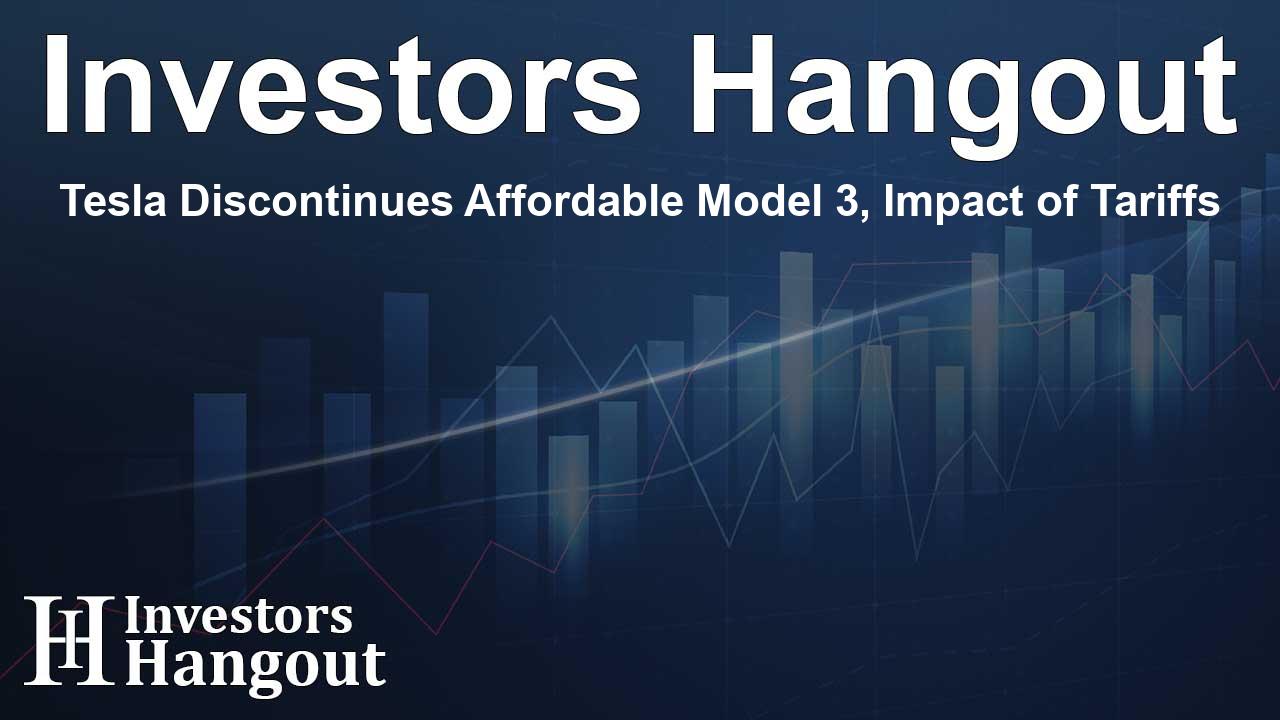Tesla Discontinues Affordable Model 3, Impact of Tariffs

Tesla Discontinues Affordable Model 3 in the United States
Tesla has made headlines recently by discontinuing its most affordable Model 3 variant in the US. This decision, as noted by various reports, reflects a larger context of changing economic conditions and regulatory pressures that the electric vehicle (EV) manufacturer is navigating.
Influence of New Tariffs
Recent increases in tariffs on imports from China have significantly impacted Tesla's operations. Specifically, the tariffs include a staggering 100% tax on electric vehicles and a 25% tariff on crucial components such as batteries and essential minerals. This shift can be attributed to the broader geopolitical climate, affecting various industries, particularly those reliant on international supply chains.
Impact on Federal Tax Credits
Compounding the challenges is the U.S. government's regulation that restricts electric vehicles containing Chinese-made parts from benefiting from the federal tax credits. Notably, Tesla's standard Model 3—which features lithium iron phosphate (LFP) batteries sourced from China—is now ineligible for the $7,500 federal tax credit, complicating the purchasing decision for potential buyers.
Sales Performance and Market Reaction
The discontinuation comes at a time when Tesla reported lower-than-expected third-quarter delivery figures. Despite efforts to increase sales through price reductions and new incentives, Tesla delivered only 462,890 vehicles from July to September. This represents an increase of 6.4% from the previous year, yet it fell short of Wall Street’s projections of 469,828 units, indicating a potential disconnect between supply adjustments and market demand.
Future Prospects
Looking ahead, CEO Elon Musk has expressed ambition to increase annual deliveries, aiming for a significant jump from the record high of 1.8 million units achieved last year. However, with current trends, Tesla's performance in the fourth quarter must drastically improve to avoid a decrease in cumulative annual deliveries, putting the company under considerable pressure.
Competitor Landscape and Market Dynamics
Tesla’s competitive landscape is also evolving, particularly in China, where local competitors like BYD are gaining market share. The country constitutes a vital segment of Tesla's global sales strategy, accounting for approximately one-third of its overall sales. The ongoing rivalry necessitates aggressive pricing strategies and innovative financing solutions, such as zero-interest offers, to retain market dominance.
Impact of Recent Product Launches
The stock market reaction to Tesla’s recent news has been mixed. Following a notable bump from the recent unveiling of the company’s new robotaxi concept, shares saw a slight dip. This fluctuation illustrates the unpredictable nature of investor sentiment, especially amid rapid changes in product strategy and market focus, such as the shift towards AI-driven autonomous technology.
Conclusion
The decision to discontinue the affordable Model 3 variant raises several questions about Tesla's future direction and its ability to navigate the complex terrain of tariffs, competition, and evolving consumer preferences. How the company manages these changes will be critical as it strives to maintain its status as a leader in the rapidly changing electric vehicle market.
Frequently Asked Questions
What happened to Tesla's affordable Model 3 variant?
Tesla has discontinued its affordable Model 3 variant in the US, no longer making it available for order.
How have tariffs affected Tesla?
New tariffs on imports from China have imposed a 100% tax on electric vehicles and impacted Tesla's costs and pricing strategies.
Are there tax credits available for Tesla vehicles?
Vehicles that contain parts made in China, including the standard Model 3, are now ineligible for the federal $7,500 tax credit.
What were Tesla's third-quarter deliveries?
Tesla delivered 462,890 vehicles in the third quarter, which is below market expectations but represents a 6.4% increase from the previous year.
What does the future hold for Tesla?
CEO Elon Musk aims to increase annual deliveries but faces significant challenges in meeting the ambitious targets amid stiff competition and changing market conditions.
About Investors Hangout
Investors Hangout is a leading online stock forum for financial discussion and learning, offering a wide range of free tools and resources. It draws in traders of all levels, who exchange market knowledge, investigate trading tactics, and keep an eye on industry developments in real time. Featuring financial articles, stock message boards, quotes, charts, company profiles, and live news updates. Through cooperative learning and a wealth of informational resources, it helps users from novices creating their first portfolios to experts honing their techniques. Join Investors Hangout today: https://investorshangout.com/
Disclaimer: The content of this article is solely for general informational purposes only; it does not represent legal, financial, or investment advice. Investors Hangout does not offer financial advice; the author is not a licensed financial advisor. Consult a qualified advisor before making any financial or investment decisions based on this article. The author's interpretation of publicly available data shapes the opinions presented here; as a result, they should not be taken as advice to purchase, sell, or hold any securities mentioned or any other investments. The author does not guarantee the accuracy, completeness, or timeliness of any material, providing it "as is." Information and market conditions may change; past performance is not indicative of future outcomes. If any of the material offered here is inaccurate, please contact us for corrections.